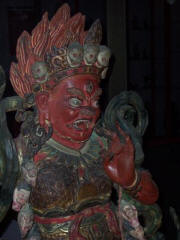Search
Related Articles
- Yama: Lord of Death
- Meng Po: Lady of Forgetfulness
- Hell Bank Notes
- Brief History of Taiwan
- Geography of Taiwan
- Mid-Summer Ghost Festival
- The Beauty of Taiwan Culture
- The Culture of Taiwan's Indigenous Peoples
- Taiwan Travel Photos and Review
Sponsor Ad
Chinese Culture >> Culture in Taiwan >> Yama: Lord of Death
Yama: Lord of Death
Yama also known as Yamaraja in India, Yanluo in China and Enma-O in Japan, is the lord of death. Yama belongs to an early stratum of Vedic mythology. In Vedic tradition Yama was considered to have been the first mortal who died and espied the way to the celestial abodes, and in virtue of precedence he became the ruler of the departed. In some passages, however, he is already regarded as the god of death. Yama's name can be interpreted to mean "twin", and in some myths he is paired with a twin sister Yamī
 The
Vedic Yama, with certain changes of function, was the basis for the Buddhist
Yama, judge of the dead, who presides over the Buddhist Hells. The Buddhist Yama
became an integral part of Chinese and Japanese mythology. Although ultimately
based on the god Yama of the Hindu Vedas, the Buddhist Yama has developed
different myths and different functions from the Hindu deity. He has also spread
far more widely, and is known in every country where Buddhism is practiced,
including Tibet, China and Japan.
The
Vedic Yama, with certain changes of function, was the basis for the Buddhist
Yama, judge of the dead, who presides over the Buddhist Hells. The Buddhist Yama
became an integral part of Chinese and Japanese mythology. Although ultimately
based on the god Yama of the Hindu Vedas, the Buddhist Yama has developed
different myths and different functions from the Hindu deity. He has also spread
far more widely, and is known in every country where Buddhism is practiced,
including Tibet, China and Japan.
Naraka is usually translated into English as "hell" or "purgatory". A Naraka differs from the hells of western religions in two respects. First, beings are not sent to Naraka as the result of a divine judgment and punishment; second, the length of a being's stay in a Naraka is not eternal, though it is usually very long. Instead, a being is born into a Naraka as a direct result of his or her previous karma (actions of body, speech and mind), and resides there for a finite length of time until his karma has achieved its full result.
Chinese Di Yu, Japanese Jigoku, literally "earth prison", is the realm of the dead or "hell" in Chinese mythology and Japanese mythology. It is based upon the Buddhist concept of Naraka combined with local afterlife beliefs. Incorporating ideas from Taoism and Buddhism as well as traditional religion in China, Di Yu is a kind of purgatory place which serves not only to punish but also to renew spirits ready for their next incarnation. Jigoku is similar, with Shinto concepts. These names are interchangeable with the concept of Naraka.

